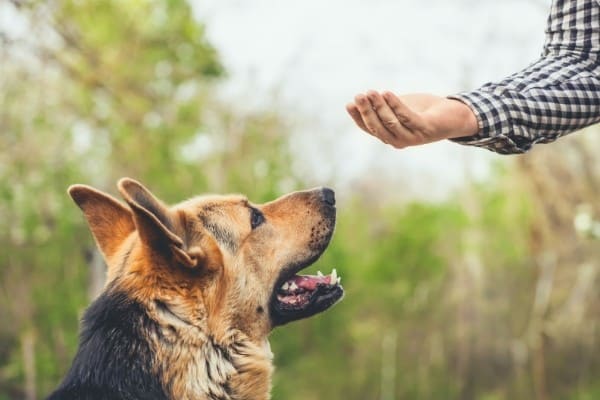If you are considering German Shepherd ownership, you may be wondering how easy these dogs are to train.
If you know anything about the breed, you probably know that they are well known for being grounded work dogs, but does that mean that they’ll be easy for you to train? Here is what you need to know about training German Shepherds.
Are German Shepherds easy to train? German Shepherds are one of the easiest to train breeds out there. These dogs are extremely intelligent, highly sensitive, and courageous enough to do just about anything for you. A long history of working closely with people prepares these dogs to be your partner.
German Shepherds are some of the easiest dogs to train, but what do you need to know when it actually comes time to pull out the treats and do a training session?
German Shepherds are easy to train, but there are some things that can hurt the process and other tips which make it much easier. Here’s what you need to know about training a German Shepherd.
Why Are German Shepherds Easy To Train?
If you are looking for a breed that can do practically anything that you want them to do, the German Shepherd is a great pick.
These dogs are intelligent and eager to please, making them a breeze to train. Here are a few of the primary reasons why German Shepherds are so easy to train.
Intelligent
German Shepherds are extremely intelligent. They were bred for many years to both herd and protect a flock, which required a lot of independent thinking as well as careful attention to the handler. For this reason, they are excellent at using their minds both to problem-solve on their own and to focus on you and decode your instructions.
These dogs are problem solvers who prefer to keep their minds busy. You won’t have to encourage your German Shepherd to seek out mental stimulation. Your Shepherd will already be looking for ways to engage that active mind. You just have to provide an outlet.
Eager-To-Please
German Shepherds are highly focused on their humans and desperate for approval. Many German Shepherds can be trained very effectively using few rewards besides the praise and happiness of their human.
Brave
You may be surprised to learn that courage is important in the training process, but if you want your dog to perform at any time besides when they are comfortable, relaxed, and in a familiar environment, you need a dog who is brave enough to plow forward through your training regardless of distractions and anything that could potentially be frightening
Form Close Bonds
The German Shepherd tends to form an extremely close bond with their family. This makes them not only eager-to-please but specially tuned in to their person.
Your German Shepherd may seem to know what you are thinking even before you do. This means that sometimes they will perform a behavior you want before without you even realizing you’re asking for it.
The bond a German Shepherd forms with it’s owner can sometimes lead to jealous behavior, which we talk all about in the article.
When and How to Get Started with Training
You should begin training your German Shepherd as soon as possible. Good breeders begin basic training like teaching the dog to come when called and potty training when dogs are only a couple of weeks old.
As soon as you get your puppy, you should continue training. However, if you haven’t trained your dog up until now or you have adopted an untrained German Shepherd, don’t lose hope.
Shepherds are smart and adaptive and take to training at any age. Here are a few essential training techniques that you can begin with your German Shepherd regardless of their history.
Trick Training
Trick training is a great fit for German shepherds because it is fun, active, and variable. To train your dog to do a trick, lure them into the posture or behavior with a treat and then mark with a praise word and reward.
Start with very simple behaviors, like sitting, standing, and asking your dog to come to you, and progress to more complicated tricks like jumping through hoops, running in circles around you or between your legs, and performing a series of behaviors.
Self-Control Training
One of the most important skills to train a powerful breed dog is the ability to think on their own–this requires self-control training first. Your untrained puppy or adult dog may have extremely little self-control and may be unable to focus on anything for more than an instant.
Increase your dog’s self-control by teaching them to stay for a reward and gradually increasing the time that they need to stay.
Socialization
German Shepherds tend to be wary of new people and animals, so regular socialization from the time that they are young is extremely important for them to develop into well-socialized dogs.
Remember, German Shepherds are brave enough to fight for you and intelligent enough to have their own opinions and make mistakes, so it is essential that they view other people and animals in the right perspective.
| TOYS! Having some special toys that your dog only gets during training sessions can be huge when it comes to their focus and eagerness to learn. Check Out Our Favorites! |
Training Basics
There are many ways to successfully train a German Shepherd, however, there are a few basics that are extremely important to maintain regardless of how you decide to train your Shepherd.
- Use positive reinforcement. German Shepherds are sensitive dogs and many of them are devoted enough to their people to work just for affection and praise. Find out what motivates your dog and use plenty of positive reinforcement throughout their training regiment. Well motivated German Shepherds will use all of their mind and effort in order to achieve the goals you have for them.
- Never punish. Back in the old days, many German Shepherds were trained to do police work with harsh training tactics. Many police officers found that this backfired when dogs became unpredictable and untrusting of humans. Now, trainers recommend training Shepherds in only a positive manner and never using punishment or harsh training tactics.
- Many short sessions work best. Even for a highly-focused dog like the German Shepherd, trying to focus on training for a half hour or an hour at a time can be very challenging. It is best to work in small sessions of 5 or 10 minutes per training session, especially when teaching new skills that require a lot of thought.
Common Mistakes to Avoid
Since so many people get the German Shepherd with strong opinions about what this breed is, it shouldn’t be surprising that there are some common mistakes when training the German Shepherd. Here are a few mistakes that it is important you avoid.
Thinking your dog is better trained than they are
If you have been dedicated to training your Shepherd since puppyhood, by the time they are about a year or so old you might expect that they are extremely well-trained and trustworthy off-leash and in other challenging situations.
Unfortunately, your dog’s mind is still developing. Most dogs go through two fear periods, one at around eight to ten weeks of age, when most dogs are going to their new home, and another at between 6 and 14 months of age.
During the fear periods, dogs may react with fear to things that previously didn’t bother them and are extremely sensitive to bad experiences.
Since German Shepherds are very sensitive, these fear periods often hit them harder than other breeds. If you assume that your dog is trained enough to resist stressors and handle difficult situations at around a year, you may be blindsided when their fear period kicks in and they suddenly ignore all of your commands.
Being repetitive
It is true that in order for your German Shepherd to learn a new behavior they will need to repeat it many times in a wide variety of situations. That said, if you expect your Shepherd to sit through constant drills of the same behavior without getting bored, you will be sorely disappointed.
In order for you to get the most out of your German Shepherd’s training, you need to keep it fun for them. Scatter training throughout the day and surprise your dog. If your dog is moving onto the next trick in their routine before you ask them, it is time to change up the routine.
Related Questions
How do I make self-control training fun?
Make self-control training fun by asking your dog to stay in a specific position or teaching “freeze”, when your dog will have to stop moving whenever you tell them to and stay like that until you release them.
This kind of training may not seem very fun at the beginning, but as time goes on, you and your dog will both enjoy it and it will soon be clear how important it is.
What if my German Shepherd isn’t obeying?
Shepherds are dogs who love to work for you and will bend over backward trying to understand what you want. If your German Shepherd isn’t doing something that you want them to do, the chances are that you haven’t explained it well enough, not that your Shepherd is being obstinate.





